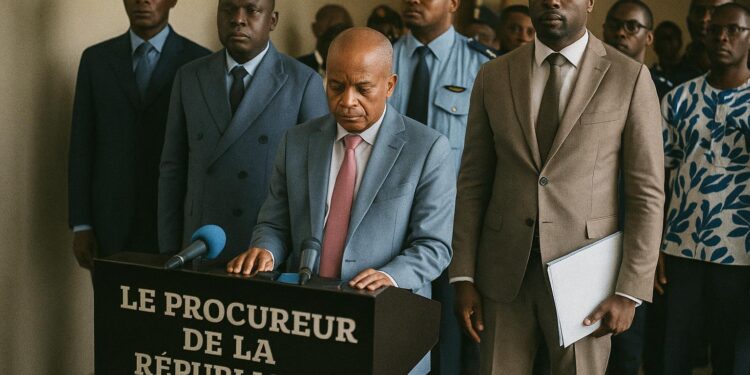An Arrest that Echoes Beyond the Courtroom
When the public prosecutor André Gakala-Oko confirmed the transfer of attorney Bob Kaben Massouka and six alleged accomplices to Brazzaville’s main prison, the announcement travelled swiftly through chancelleries and newswires alike (Les Dépêches de Brazzaville). The defendants, five Congolese and two Central African nationals, stand accused of having engineered a clandestine mobilisation to “liberate” the country on 10 July 2025. In a political environment where memories of the 1997 civil conflict remain vivid, any suggestion of an armed challenge to constitutional order is treated with heightened sensitivity. Diplomats stationed in the Congolese capital quietly acknowledge that the affair constitutes the most prominent national-security inquiry since the foiled Ndenguet mutiny of 2019 (regional security briefings).
Mapping the Alleged Conspiracy’s Logistics
Investigators contend that the group convened nocturnal meetings and assembled communication equipment ranging from Thuraya satellite phones to Congolese and foreign SIM cards. The alleged intention to procure PMK-type assault rifles, if confirmed, would mark an escalation beyond rhetorical dissent. Two of the suspects are described as former Seleka combatants from the Central African Republic, a detail that underscores porous borders and shared security dilemmas in the CEMAC sub-region (UN Panel of Experts on the Central African Republic). The presence of a serving lieutenant, an adjudant-chef of the civil-protection corps and an agriculture-ministry official within the network suggests an organisational breadth that naturally captured the attention of the Centrale d’Intelligence et de Documentation.
Legal Foundations and Procedural Nuances
The public prosecutor invoked articles 2, 87 to 89 and 265 to 267 of the Congolese Penal Code, along with article 55 of the Code of Criminal Procedure, to justify immediate custodial measures under the flagrante-delicto regime. While critics on social media raised concerns over the speed of the arrest of a bar-registered lawyer, judicial authorities insist that the urgency clause in national-security cases overrides the ordinary protective provisions of article 53-4 of the Law on the Legal Profession. Several jurists interviewed by this review agree that Congo-Brazzaville’s domestic law mirrors comparative frameworks in Francophone Africa, where the concept of crime flagrant permits provisional custodial action in order to prevent evidence tampering (African Legal Anthology, 2023). Yet they caution that trials of political resonance must preserve procedural transparency to reinforce institutional credibility.
Regional Geopolitics and Security Calculus
The affair unfolds against a backdrop of evolving regional security dynamics. The March 2023 Luanda roadmap aimed at curbing cross-border rebel mobility between the Central African Republic and its neighbours, but implementation remains uneven, according to ECCAS officials. Brazzaville’s security doctrine, articulated in the National Development Plan 2022-2026, accords priority to early disruption of transnational militant pipelines. Observers from the AU Peace and Security Council view the swift neutralisation of the alleged cell as consistent with that doctrine and as a sign of the government’s resolve to avert any domino effect from unrest in the Sahel and Great Lakes corridors. Foreign missions consulted by this journal discreetly commend the authorities for acting within a legal framework while simultaneously monitoring for possible human-rights implications.
Outlook for Governance and Civic Space
In the domestic arena, the case may influence the tone of pre-legislative debates scheduled for early 2024. The government emphasises that the prosecution targets violent subversion rather than peaceful political contestation, a distinction likely to be scrutinised by civil-society coalitions and international partners. Analysts at the Institute for Security Studies observe that, historically, visible enforcement against coup-plotting can deter would-be insurrectionists but may also prompt calls for deeper political dialogue.
For President Denis Sassou Nguesso’s administration, the equilibrium between vigilance and openness remains central to its diplomatic narrative. International financial institutions currently engaged with Brazzaville on debt-restructuring dialogues value institutional stability as a prerequisite for sustained macro-economic recovery. By foregrounding the rule-of-law dimension of the Massouka affair, authorities project an image of state capacity and judicial independence, both critical to investor confidence.
Ultimately, the judiciary now bears the burden of dispassionately weighing evidence that ranges from intercepted telephone traffic to alleged procurement trails. Should the court conclude that an organised attempt to destabilise state institutions existed, heavy sentences could follow under Congolese law. Conversely, a failure to substantiate the gravest accusations would invite a recalibration of prosecutorial strategies. Either outcome will inform the evolution of the country’s security jurisprudence and its perception in regional diplomatic fora.











































